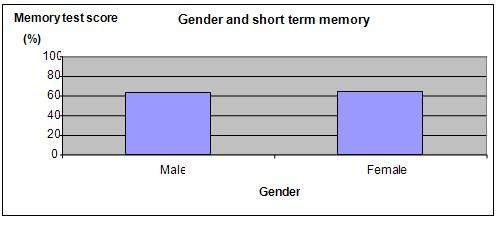| Complexity level: | 3 |
| Project cost ($): | 5 |
| Time required: | Preparation will take approximately one hour, and observation and recording of data will require another hour |
| Material availability: | Easily found |
| Safety concerns: |
Hypothesis
Female participants will have a better short term memory than male participants.
Overview
Memory
Memory is a cognitive process and refers to the information processing system in our brain that works constructively to encode, store, and retrieve information.. Our brain receives information through our five senses of sight, hearing, touch, taste and smell, and processes them by attaching meaning to these information or stimuli to make associations among ideas and concepts that are already stored in our brain. For example, we receive information through our sense of sight when we read a book, after which our brain will process the alphabets that we see to transform them into meaningful words that we understand.
There are three stages of memory, which are sensory memory, short term memory and long term memory. Sensory memory refers to the stage whereby our brain has to sort through the thousands of stimuli received though our senses. In other words, sensory memory holds the barrage of incoming sensations just long enouh for our brain to scan it and decide which stream of information needs attention.
Short term memory, on the other hand, refers to the part of our memory system that stores limited amounts of information for a limited amount of time, such as a few minutes or a few days. It normally deals with information that are not very important, or information that are non-reoccurring. For example, what you had for dinner last night might not be remembered two weeks later.
Information stored in long term memory is more lasting and permanent. For example, we will always remember our names and names of our immediate family members, and will not forget important phone numbers and birthdays. This type of information is more permanent or in other words, etched into our memory, as we need to recall and use them repetitively. Long term memory is also important in enabling students to remember concepts that have been learnt and enablesadults to acquire new job skills.
Scientific Terms
Materials
Materials required for the experiment:
- 20 male participants aged between 18 to 30 years old
- 20 female participants aged between 18 to 30 years old
- 25 objects – i.e. apple, ball, clock, chair, umbrella, banana, cup, radio, etc.
- 1 stop watch
- 40 pieces of paper and pencils
- 1 classroom with tables and chairs
- 1 curtain
- 1 assistant
Procedure
1. The independent variable in this experiment is the gender of the participants. The dependent variable is the ability of male and female participants to recall the objects they saw, which is determined by asking them to write down what they saw in a piece of paper. The constants (control variables) are the number and type of objects, the time given for the participants to look at the objects, and the time given to write down the list of objects.
2. Arrange the 25 objects in front of the classroom. Fix a curtain to hide the objects from the audience’s view before and after the start of the experiment.
3. Bring the participants into the classroom. They can either be tested together as one big group or be separated into smaller groups. Draw the curtains open and instruct the participants to look at the 25 objects and remember them for two minutes. The assistant will observe the time with the stopwatch.
4. After two minutes, draw the curtains close and give each participant a piece of paper and pencil. Instruct them to write their names, gender and age on the paper. Give the participants five minutes to recall and list down the objects that they had observed earlier.
5. Collect the papers back after five minutes. Check and tally their results, and recorded it in the table given below.

Results
Female participants were observed to have a slightly higher average score in their ability recall information from short term memory, compared to the male participants.
| Gender | Percentage of correct items recalled from short term memory (%) | Average | |||||||||||||||||||
| 1 | 2 | 3 | 4 | 5 | 6 | 7 | 8 | 9 | 10 | 11 | 12 | 13 | 14 | 15 | 16 | 17 | 18 | 19 | 20 | ||
| Male | 60 | 56 | 64 | 52 | 60 | 48 | 76 | 68 | 48 | 60 | 56 | 76 | 52 | 80 | 64 | 72 | 60 | 88 | 64 | 56 | 63 |
| Female | 76 | 64 | 80 | 60 | 56 | 68 | 48 | 72 | 44 | 68 | 72 | 56 | 84 | 68 | 72 | 56 | 48 | 60 | 56 | 76 | 64.2 |
Use the graph below to plot the experimental data recorded in the table above.

Conclusion
The experimental data and analyzed results support the hypothesis that female participants are able to recall more information from short term memory than male participants. However, the difference between the genders’ test scores was noted to be only approximately 1.2%.
Some children and adults are more gifted than others in their ability to store and recall information from memory. Their special memory skills that they have are innate, or in other words, given by nature. However, memory skills can also be developed and improved through nurturing, which can be seen from the numerous techniques available to improve our memory. Specialized books and courses are also available in the market to equip the public with memory enhancing techniques.
Also consider
The experiment can also be carried out through the use of flash cards to test the participants’ ability to recall or by asking them to memorize words.
This experiment can also be repeated again using a younger or older group of participants.
References
Memory - http://en.wikipedia.org/wiki/Memory
What is memory retention - http://ezinearticles.com/?What-is-Memory-Retention?&id=996416

